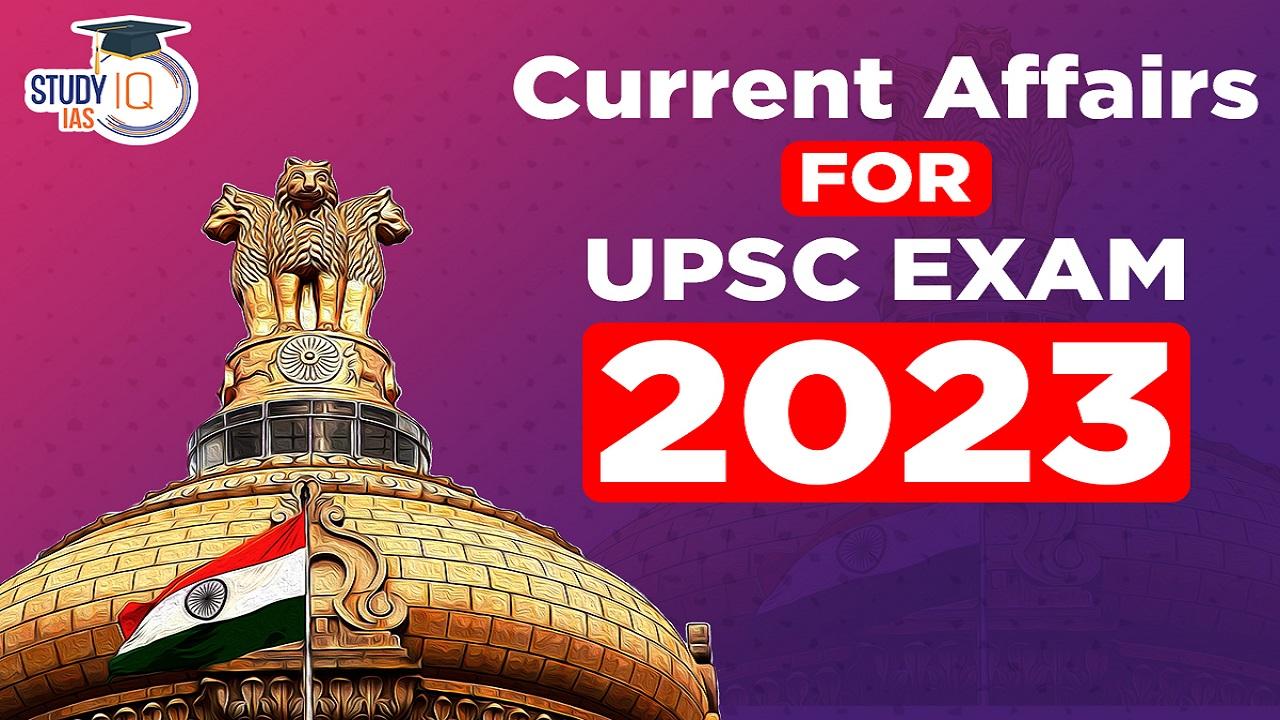Current Affairs 27th September 2023 for UPSC Prelims Exam
Pink Bloom
Context: Cabomba furcuta, popularly called as Pink Bloom due its massive flowering, has been a new threat to the Kerala’s Vembanad-Kol Wetland.
About the Cabomba furcuta
- Cabomba furcuta, also known as red cabomba or forked fanwort, is a submerged perennial aquatic plant that grows in stagnant to slow-flowing freshwater.
- The plant is native to Central and South America.
- It requires a large quantity of oxygen for its growth and it chokes water bodies and drainage canals.
- It is known for its massive flowering, which can produce a pink or purple carpet on the water surface.
- The pink color due to the presence of anthocyanins in its leaves.
- Anthocyanins are a group of pigments that are responsible for the red, purple, and blue colors of many fruits, vegetables, and flowers.
- The plant can form dense mats that block sunlight and oxygen from reaching native plants and animals. It can also reduce biodiversity and degrade water quality.

About the Vembanad-Kol Wetland
- It is the largest brackish humid tropical wetland ecosystem in Kerala.
- Fed by 10 rivers, including the Periyar, Pampa, and Meenachil rivers.
- It gets in the way of the Central Asian Flyway, harbors birds like Spot billed Pelican and others.
- It was declared as a Ramsar site of international importance in 2002.
- Ramsar Convention adopted in 1971, is an intergovernmental treaty under UNESCO that provides the framework for the conservation and wise use of wetlands and their resources.
- Currently, there are 75 Ramsar sites in India.
- Tamil Nadu has a maximum no. of Ramsar sites (14 number), followed by UP which has 10 nos. of Ramsar sites.
- Chilika Lake in Orissa and Keoladeo National Park in Rajasthan were recognised as the first Ramsar sites in India.
- Sundarbans in West Bengal is the largest Ramsar site in India.
Current Affairs 26th September 2023 for UPSC Prelims Exam
Dadasaheb Phalke Award
Context: The Veteran actor Waheeda Rehman will be conferred with the Dadasaheb Phalke Award for her contribution to Indian cinema.
The Dadasaheb Phalke Award
- Definition:
- It is the highest honour in the Indian film fraternity.
- It was instituted in 1969 by the Central Government to commemorate Dadasaheb Phalke’s contribution to Indian cinema.
- The award is presented by the President of India for outstanding contribution to the Indian cinema.
- The Award: Consists of a ‘Swarna Kamal’, a cash prize of INR 10 lakh, a certificate, a silk roll, and a shawl.
- Nodal Ministry: Presented annually by the Ministry of Information and Broadcasting.
- First Recipient of the Award: Devika Rani in 1969.
- Dadasaheb Phalke: He was a pioneering filmmaker who gave India its first film– ‘Raja Harishchandra’, in 1913. He also worked with the famous painter Raja Ravi Varma.
Collegium System
Context: The Supreme Court expressed concerns at the Central Government not deciding on several collegium recommendations for appointments and transfers of High Court judges.
What is the collegium system?
- The Collegium system in India also called “Judges- selecting- Judges”, is an internal mechanism of the judiciary, where the judges are appointed and transferred only by the judges.
- The system has evolved by means of the judgments of the Supreme Court, and not by an Act of Parliament or by a Constitutional provision.
- Composition of the collegium:
- The Supreme Court Collegium is headed by the Chief Justice of India and comprises 4 other senior-most judges of the SC.
- A High Court collegium is headed by its Chief Justice and 4 other senior-most judges of that court.

Procedures for the judicial appointments by the collegium system
- For appointing Chief Justice of India (CJI):
- The President of India appoints the CJI and the other SC judges.
- The outgoing CJI recommends his successor.
- In practice, it has been strictly by seniority ever since the supersession controversy of the 1970s.
- For appointing other SC Judges:
- SC judges are recommended by a Collegium consisting of the CJI and 4 senior-most judges of SC.
- The Collegium recommends the candidate to the Law Minister, who forwards it to the Prime Minister who then advises the President for the final appointment.
- For appointing Chief Justice of High Courts:
- President appoints CJ of HC in consultation with CJI (consults other SC collegium members) and governor of the respective state.
- The candidate is selected from outside the respective state.
- For appointing other HC judges: HC judges are also appointed by the President who consults the HC Collegium (CJ of HC and 4 senior-most HC judges), CJI (consults other SC collegium members), and the Governor of the respective state.
- For appointing Judges of Common HC: Judges of common HC are appointed by the President who consults CJI (consults other SC collegium members) and Governors of respective states.
Constitutional provisions related to the appointment of Judges
- Article 124 of the Indian Constitution deals with the appointment of Chief Justice and Judges of the Supreme Court.
- Article 126 of the Indian Constitution deals with the appointment of acting Chief Justice.
- Article 127 deals with the appointment of Ad Hoc judges.
- Article 217 provides the procedure regarding the appointment of judges in the High Courts.
- Article 222 of the Indian Constitution provides the transfer of Judges from one High Court to another.
- Article 224 deals with the appointment of acting judges and additional judges.
- Article 233 of the Indian Constitution deals with the appointment of District Judges.
India-UN Capacity Building Initiative
Context: India and the United Nations have jointly launched the ‘India-UN Capacity Building Initiative’ to enhance the capabilities of Global South countries.
The India-UN Capacity Building Initiative
- Aim: To Share India’s development knowledge and expertise with Global South partners through comprehensive capacity-building programs and training.
- Key Features:
- UN-India team and the Bill & Melinda Gates Foundation will partner to leverage India’s Technical and Economic Cooperation platform.
- The initiative complements the existing India-UN partnership through the “India-UN Development Partnership Fund”.
- The India-UN Development Partnership Fund (I-UN DPF) is a dedicated facility established in 2017 within the United Nations Office for South-South Cooperation (UNOSSC).
- The I-UN DPF supports Southern-owned and led, demand-driven, and transformational sustainable development projects across the developing world.
- It will operationalize the development-related goals of India’s G20 Presidency, including the G20 Action Plan for Accelerating Progress on the Sustainable Development Goals (SDGs) and building Digital Public Infrastructure.
- Significance:
- Contributes to global SDG efforts through enhanced South-South Cooperation.
- Demonstrates India’s unwavering commitment to strengthening its developmental ties with the Global South.
The Global South
- The Global South broadly comprises countries in the regions of Africa, Latin America and the Caribbean, Asia (excluding Israel, Japan, and South Korea), and Oceania (excluding Australia and New Zealand).
- These countries are generally characterized by relatively low levels of economic and industrial development.
New Angel Tax Rules
Context: The Central Government has issued new rules that determine the value of investments made by both non-resident and resident investors under the new angel tax system introduced in the Finance Act of 2023.
Understanding Angel Tax
- An angel tax is imposed on unlisted businesses that get funding from an angel investor.
- Angel Investor: An angel investor provides initial seed money for startup businesses, usually in exchange for ownership equity in the company.
- When an angel investor funds the new business ventures, the startup is obliged to pay a part of their investment as tax to the government under Section 56 (2) (vii) (b) of the Income Tax Act of 1961.
- It is levied when an unlisted company issues shares to an angel investor at a price higher than its fair market value (FMV).
- FMV: The fair market value represents what a single share of stock would be worth on the open market.
- Rate: The angel tax is imposed at 30.9% if the amount invested exceeds the startup’s FMV.
- Need: The Central Government introduced the angel tax in Finance Act, 2012 to curb money laundering and make it easier for businesses to comply with the tax norms.
New Norms for Angel Tax
- Background: Earlier, only investments by domestic investors or residents in closely held companies or unlisted firms were taxed over and above the fair market value. This was referred to as an angel tax.
- But the Finance Act, 2023 said that such investments over and above the FMV will be taxed irrespective of whether the investor is a resident or non-resident.
- Post the amendments in the Finance Act, concerns were raised over the methodology of calculation of fair market value.
- Start-ups also raised concerns on angel tax being extended to non-resident investors as it could have impacted foreign investments – a key source of their funding.

- Key Amendments in Income Tax Act:
- In addition to the two methods for valuation of shares, namely, Discounted Cash Flow (DCF) and Net Asset Value (NAV) method, available to residents, the Govt has introduced five different valuation methods for non-resident investors:
- Comparable company multiple method,
- Probability weighted expected return method,
- Option pricing method,
- Milestone analysis method and
- Replacement cost methods.
- The Govt has also offered a 10% tolerance for deviations from the accepted share valuations.
- The Govt has also introduced a mechanism for arriving at the fair market value of Compulsorily Convertible Preference Shares (CCPS) for investment from residents as well as non-resident residents.
- Compulsory Convertible Preferential Shares are a type of financial instrument issued by companies to raise funds from investors.
- These shares have a mandatory conversion feature, which requires the conversion of the shares into equity within a predetermined period.
- Thus, if an early investor has CCPS, he can have more rights than other investors who come in later at a higher valuation.
- Compulsorily Convertible Preference Shares are a key element of start-up financing.
- The fair value of the shares will be as determined by the methods provided. Anything above, after accounting for a 10% margin, will be deemed as “taxable premium”.
- In addition to the two methods for valuation of shares, namely, Discounted Cash Flow (DCF) and Net Asset Value (NAV) method, available to residents, the Govt has introduced five different valuation methods for non-resident investors:
- Significance of Amendment:
- The amended rules are aimed at bridging the gap between the rules outlined in FEMA and the Income Tax.
- The amendments to Indian Income Tax Act will bring positive changes by:
- offering taxpayers flexibility through multiple valuation methods,
- simplifying the valuation date consideration,
- incentivizing venture capital investments,
- facilitating investments from notified entities,
- adopting internationally recognized approaches for valuation, thereby attracting foreign investments.
- Also, the inclusion of a tolerance threshold for minor valuation discrepancies further enhances efficiency and fairness in tax assessments, ultimately benefiting both taxpayers and the government.


 SSC Stenographer 2024 Notification Out a...
SSC Stenographer 2024 Notification Out a...
 IB SA MTS Final Result 2024 Out at mha.g...
IB SA MTS Final Result 2024 Out at mha.g...
 Model Skill Loan Scheme, Eligibility, Re...
Model Skill Loan Scheme, Eligibility, Re...

















